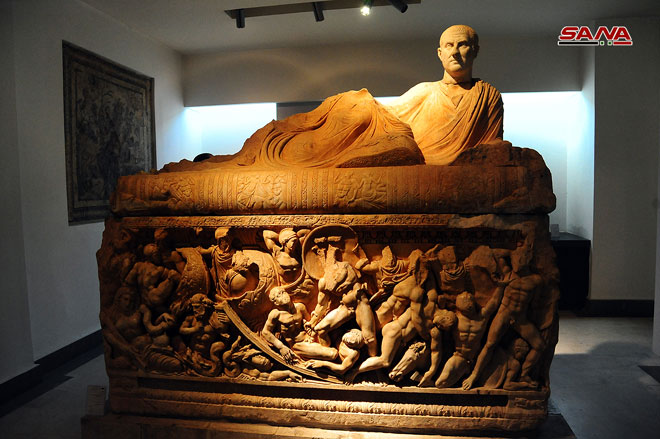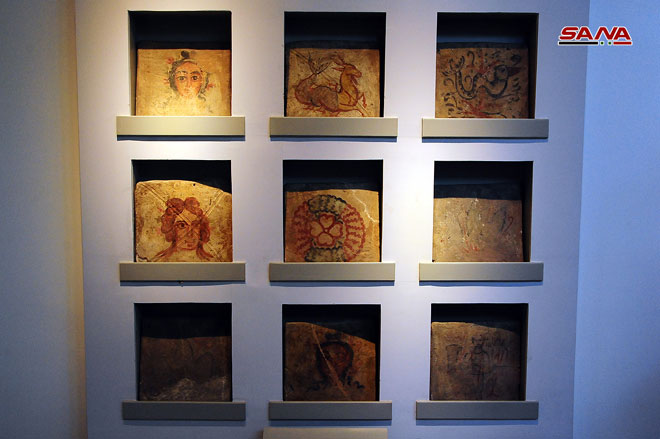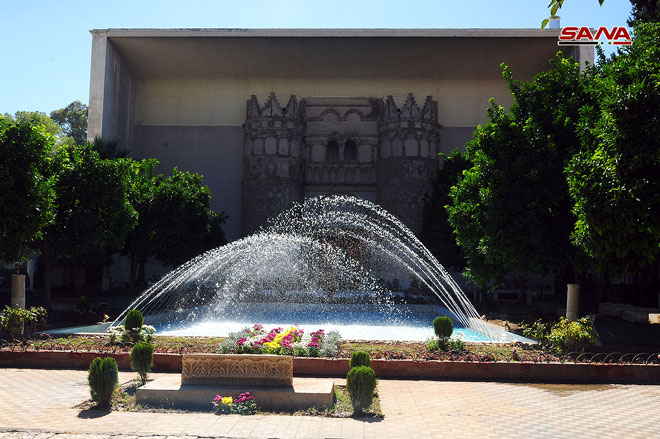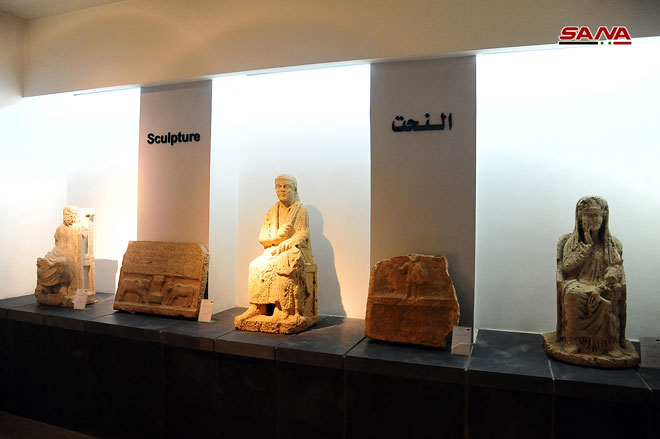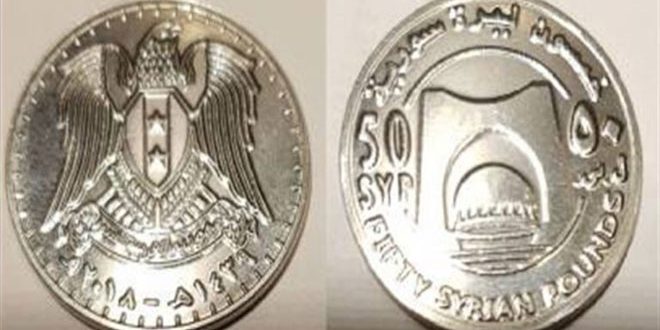October 27, 2018 - Russia, Germany, France and Turkey call for lasting ceasefire, Constitutional meeting for Syria
Russia, Germany, France and Turkey call for lasting ceasefire, constitutional meeting for Syria | Reuters
ISTANBUL - The leaders of Russia, Germany, France and Turkey stressed the importance on Saturday of a lasting ceasefire in Syria, and said a committee to create a new constitution should meet by the end of the year.
Putin hopes Syria’s constitutional committee begins work by end of 2018
Moscow hopes that by the end of 2018 Syria’s constitutional committee will start functioning, Russian President Vladimir Putin said on Saturday at a news conference after the four-party summit on Syria in Istanbul.
"We hope that the constitutional committee will have been negotiated in full, in case of appropriate conditions,
by the end of the current year and it will start working," Putin said adding that the Syrian National Dialogue Congress had passed a decision in Sochi to set up and convene this body.
The Russian president pointed out that afterwards, the issue was negotiated with both President Bashar al-Assad and the Syrian opposition, which allowed making up two parts of the given committee - from the opposition and the government.
"Now we need to agree the third part with participation of public organizations and representatives of various public bodies," Putin said noting that the work was not easy, as each side would be striving to "fill this part with those people who they trust."
Putin emphasized that productive work is impossible without trust.
"Unconditionally, we should hold meaningful consultations both with the Syrian government and our partners in Iran, since
without Iran, who as you know is country guarantor of the peace process and ceasefire as well as demilitarized zones,
the issue will not be solved effectively," he said.
The Russian president pointed out that the work should be done in a calm and respectful tone towards the legitimate government of the Syrian Arab Republic to achieve the most tangible results.
He also said that the work to establish the Syrian Constitutional Committee should be thorough and competent so that all sides recognize this body, adding that Moscow viewed the launch of the Constitutional Committee as its top priority.
"At the same time, decisions made during the Syrian National Dialogue Congress in Sochi should be taken into account.
A committee of this kind must certainly be recognized by all Syrian sides and have their respect. Only in this case this body will be viable and efficient and will be able to prepare and carry out the long-overdue constitutional reform
that would strengthen the Syrian state and unite the Syrian society," Putin said.
"The work to form the committee will be serious and elaborate,
and must be done properly," he added.
"Russia, as a guarantor of the Astana process,
will actively participate in it."
On January 30, the Syrian National Dialogue Congress, held in the Russian Black Sea resort of Sochi, agreed to set up a constitutional committee that will be tasked with drafting a new constitution for Syria. The committee was supposed to draw on a pool of 150 names (100 names from the government and internal moderate opposition and 50 names from external opposition).
Common goal
The presidents of France and Turkey also urged creating the Syrian constitutional committee before the end of the year.
"We call for completing the work to set up the Constitutional Committee of Syria by the end of the year," Recep Tayyip Erdogan said.
Meanwhile, French President Emmanuel Macron said
"this is what we all want."
"The constitutional committee needs to be established, and should hold its first meeting by the end of the year. This is what we all want," he said.
"Creating it will become a part of the political settlement in Syria."
"It needs to be formed in order to prepare transparent elections monitored by the international community," the French leader added.On Saturday, Istanbul hosted a four-party summit on Syria that was attended by Russian President Vladimir Putin, German Chancellor Angela Merkel, French President Emmanuel Macron and Turkish President Recep Tayyip Erdogan.
On January 30, the Syrian National Dialogue Congress, held in the Russian Black Sea resort of Sochi, agreed to set up a constitutional committee that will be tasked with drafting a new constitution for Syria. The committee was supposed to draw on a pool of 150 names (100 names from the government and internal moderate opposition and 50 names from external opposition).
Syrian political process must result in elections with participation of refugees — Merkel
Saturday’s summit of Russia, Turkey, Germany and France to discuss the Syrian issue
was "productive" and demonstrated that the participants share the common goal of political settlement, German Chancellor Angela Merkel said.
"The meeting demonstrated that there is common determination to solve the problem," the German leader said.
"A joint solution can be achieved not through military means, but only through political effort under the UN aegis."
Merkel said that elections would become a logical continuation of the political process.
"We need transparent elections, that will be held under supervision of international observers.
Refugees should take part in this process as well," she went on, adding that this was issue was reflected in the summit’s final communique.
The German chancellor said the Syrians must determine their future themselves. "This conflict cannot be solved by political means," she continued.
Merkel also noted that the September 17 agreements between Russia and Turkey to set up a buffer zone in the province of Idlib should evolve into a full-fledged ceasefire, and progress on this issue is already visible.
"Today we undertook to do our best to turn this agreement into a long-term ceasefire," Merkel said.
"This process needs to continue.".
Assad’s future not discussed at four-way talks in Istanbul — Putin
The four-way summit on Syria did not touch upon Syrian President Bashar al-Assad’s future in the country’s political system, Russian President Vladimir Putin said on Saturday at a news conference after the summit.
"Certainly, we did not discuss any individuals," the Russian leader said when asked about the al-Assad’s fate. "
It is counterproductive if we seek a positive result at the end of our road."
The Russian president pointed out that
"the Syrians should decide the future of their own country, including naming persons on political stage."
According to Putin, the launch of the political process establishing the constitutional committee should become one of the conditions for this choice.
"That is what we have been doing today," he concluded.
Supporting political process
Putin said the leaders of Russia, Germany, France and Turkey have confirmed at the summit in Istanbul that the Syria conflict might be resolved through political and diplomatic efforts.
The Russian president pointed out that most of the Syrian territory had been retaken from terrorists and so the country was in the process of transitioning to peaceful construction.
"All participants in the meeting are united in the main thing that long-term stability in Syria could be achieved through political and diplomatic steps in full compliance with Resolution 2254 of the United Nations Security Council and in strict compliance with principles of unity, sovereignty and territorial integrity of the Syrian Arab Republic," Putin said.
He added that "the Syrians should decide on their country’s future by themselves."
"In this context, we have discussed prospects for the Astana format and so-called Small Group (comprising the UK, Germany, Jordan, Saudi Arabia, the US and France - TASS) to join their efforts. In our view, it could facilitate the beginning of a real political process in Syria and could attract more motivated and constructively minded representatives of Syrian society," Putin said.
The Russian president thanked the Turkish leadership for hosting the summit.
According to him, at the four-way talks "serious work was done to coordinate approaches to fundamental issues for resolving the Syria conflict."
"The joint statement we adopted [today] mirrors determination of Russia, Turkey, Germany and France to enhance cooperation in the interests of normalization in the Syrian Arab Republic, to launch an effective intra-Syrian dialogue and to carry out necessary state reforms and transformations," Putin said,
underlying that Russia, Turkey and Iran had created favorable conditions for that work in Astana.
On Saturday, Istanbul hosted a four-party summit on Syria that was attended by Russian President Vladimir Putin, German Chancellor Angela Merkel, French President Emmanuel Macron and Turkish President Recep Tayyip Erdogan.
Eradicating terrorists
Putin went on to say that Russia reserves the right to help eradicate terrorists in the Syrian province of Idlib should they carry on with provocations and block establishment of a demilitarized zone there.
Putin pointed out that he and Turkish President Recep Tayyip Erdogan informed in detail German Chancellor Angela Merkel and French President Emmanuel Macron about implementation of the Russian-Turkish agreements on Idlib. The Russian president dubbed the establishment of a de-escalation zone and a demilitarized zone in Idlib as a provisional measure.
"We hope that the Turkish side ensures in the near future that the opposition will finish withdrawing heavy weapons and military units from the demilitarized zone," Putin said.
"We can see that our Turkish counterparts are doing their best for this."
"Should radical elements obstruct resolution of the problem and continue armed provocations from the Idlib zone,
Russia reserves the right to provide effective support to resolute efforts of the Syrian government aimed at rooting out this hotspot of terrorist threat," the Russian leader emphasized.
"Despite the fact, that the level of violence in Syria has been drastically reduced, a major task is to eradicate all the radical elements gathering there.
We must not allow the gunmen who have gained combat experience to carry on committing criminal offences, to set up ‘sleeping cells in our countries, to recruit followers and to preach extremist ideology and terror," Putin said.
Russia, Germany, Turkey, France committed to Syria’s territorial integrity - communique
The participants of the four-party summit in Istanbul - Russia, Turkey, Germany and France - are committed to the territorial integrity of Syria, according to a communique released by the German government on Saturday.
The leaders of the four nations "confirmed their commitment to sovereignty, independence, unity and territorial integrity of the Syrian Arab Republic," the document reads.
They are "full of determination to resist separatist plans, aimed at undermining sovereignty and territorial integrity of Syria, as well as national security of neighboring states."
Besides, the participants of the Istanbul meeting said
they were ready to work on creating conditions for the return of refugees and internally displaced persons. This will depend on providing them with "guarantees against armed conflicts, political persecution and unlawful detentions," as well as on rebuilding the country’s infrastructure to make sure that the population has access to water and electricity.
Russia, Germany, Turkey and France "expressed concern about risks and threats to the regional and global security, brought forth by the [Syrian] conflict." The participants of the meeting are "firmly convinced that this conflict cannot be solved by military means, that it should be settled through negotiations within the political framework and in line with [UN Security Council] Resolution 2254."
The presidents of Russia, France and Turkey - Vladimir Putin, Emmanuel Macron and Recep Tayyip Erdogan, as well as German Chancellor Angela Merkel - "welcomed the progress in the context of withdrawal of heavy weaponry and radical groups" from the province of Idlib, where Moscow and Ankara have previously agreed to set up a buffer zone. In addition, the statement underline the four leaders’ commitment to the fight against terrorism.
New formats of Syria talks help resolve conflict - Putin
New formats of talks on Syria are likely to help resolve the conflict in that country, Russian President Vladimir Putin said on Saturday at a news conference after the four-party summit on Syria in Istanbul.
"I think that an increasing number of participants in the settlement process serves this well. In essence, it was initially a proposal by the French president to join efforts of the Small Group and Astana process. That was actively supported by the Turkish president who initiated today’s meeting. I think it has served well," Putin said.
Asked about chances for a second summit of Russia, Germany, France and Turkey on Syria, Putin answered that the sides "has not negotiated this yet, but everything is possible."
Difficult process
Commenting on a reporter’s words about protracted negotiations on Syria’s Constitutional Committee, Putin emphasized that "prior to the beginning of the Astana process, the sides had not gathered for a year, this process [of the Syrian settlement] had been merely mothballed.
It is a very complicated process and nothing at all had been happening."
"Then we - alongside the presidents of Turkey and Iran - initiated the Astana process, the ball was set rolling, and proposals started coming," he said.
"It was not a simple story to host the Syrian National Congress in Sochi. Big spadework was underway. Yes, achieved agreements are not implemented as fast as we would like to, but there is movement ahead though," Putin underscored.
In particular, the Syrian government was persuaded into "presenting their part of the list to set up the Constitutional Committee." Later, due to Turkey’s efforts, "a combined part from the opposition appeared."
"At present, the third part should be made. Yes, the process is not simple.
It should involve people who are trusted by all parties to the conflict," he added.
Putin asked to "have patience and to treat all participants of this process with respect."
"We expect to have success only on this road," the Russian president concluded.
France's suggestion
French President Emmanuel Macron told reporters after the four-way talks in Istanbul that the Astana format and the Small Group on Syria should team up for Syrian settlement.
"There are several formats of Syrian settlement. We need the Astana format (Russia, Iran and Turkey) and the Small Group (UK, Germany, Egypt, Jordan, Saudi Arabia, the United States and France) to join forces. I have already spoken about that, including during my visit to St. Petersburg in May," the French leader said.
"The efforts by those formats overlap, as I have already told, and the summit in Istanbul is a step forward in this direction."
"Now, on one hand, there is the work by Astana format members, and on the other - by the United States and other members of the small group.
It is important that they act in coordination," Macron went on.
Meanwhile, Turkish President Recep Tayyip Erdogan said Saturday’s summit of Russia, Germany, France and Turkey demonstrated that the Astana format’s work may be improved if new members join it.
"The work that was done within the framework of the Astana negotiations has become an example of exemplary international cooperation. Today, as France and Germany joined us, we could see that it is possible to further improve cooperation within the Astana Format.
The more countries join this format, the quicker we will solve the problem [of the Syrian crisis]," he said.
He said that the format of the four-nation summit may continue and be expanded.
"
Will this format continue and be expanded? If it proves to be useful, then it can undoubtedly be continued if a joint decision is made on the issue," Erdogan said.
The Turkish leader said that Iran, which is also a member of the Astana group, will be informed about the results of Saturday’s talks.
On Saturday, Istanbul hosted a four-party summit on Syria that was attended by Russian President Vladimir Putin, German Chancellor Angela Merkel, French President Emmanuel Macron and Turkish President Recep Tayyip Erdogan.
October 28, 2018 - Turkey to focus on eastern bank of Euphrates in Syria
Turkey to focus on eastern bank of Euphrates in Syria
Erdogan states his priority is to end Kurdish dominance across his southern border.
Turkey to continue operations in east Euphrates in case of security threat — president
Turkey will continue military operations in the east of Euphrates if it sees the situation there as a threat to its national security, Turkish President Recep Tayyip Erdogan told reporters after the four-way talks on Syria in Istanbul on Saturday.
"In the east of Euphrates, we will continue our operations against forces that constitute a threat to our security," he said.
"Turkey will not let terrorist organizations thrive near its borders or in any other part of Syria," he added.
Erdogan also said that
Turkey will continue its cooperation with Moscow on the situation in Syria’s Idlib province.
Turkish military reportedly attacks Kurdish forces in northern Syria
Addressing the issue earlier in October, Turkish President Recep Tayyip Erdogan vowed to clear the area east of the Euphrates River in Syria from Kurdish militia, which is regarded by Ankara as an affiliate of the Kurdistan Workers’ Party (PKK), listed as a terrorist organization in Turkey.
The bombardment targeted the Zor Magar area, which is located to the west of Syria’s Ayn al-Arab region and was aimed at preventing “terrorist activities,” the Anadolou news agency reported.
Commenting on the situation in the region, Turkish Defense Minister Hulusi Akar stated that Ankara would not allow “the creation of a terror corridor” near the Turkish border, ranking the Kurdish PYD and YPG groups among the threats to the country.
Earlier this year, Ankara carried out an offensive against YPG forces in Syria’s Afrin during a military operation called Olive Branch, which was followed by
numerous raids against the Kurdish militia in Syria and northern Iraq.
Damascus has repeatedly condemned the unauthorized operations on Syrian territory and stated that Turkey has been violating the country’s sovereignty.
Sources: Sputnik, Anadolu
Dozens of drones shot down near Russian military base in Syria in past two months — Putin
Terrorists continue attacks in Idlib, with dozens of drones shot down near the Russian military base in the country in the past two months or so, Russian President Vladimir Putin told reporters after a four-party summit on Syria held in Istanbul on Saturday.
"Russia reserves the right to support the Syrian government if terrorists carry out provocations from the Idlib zone," Putin said.
"Quite recently - I have informed my counterparts - artillery strikes were delivered from the Idlib zone in the direction of Aleppo. In the recent six weeks to two months, our air defense has shot down 50 aerial vehicles near our base in Hmeymim."
"Everything we do with our Turkish partners and friends in this direction is compliant with the tasks we had set for ourselves," he said. "We want to ensure demilitarization of the Idlib zone at a distance of 15-20 kilometers so that it was free from heavy weapons and all sorts of radical groups."
"
The work is in full swing. Turkish partners meet their commitments, although not everything is done in full," he said.
"We see that the work is difficult and we are set to keep cooperating with Turkey in this area," the Russian leader assured.
On Saturday, Istanbul hosted a four-party summit on Syria that was attended by Russian President Vladimir Putin, German Chancellor Angela Merkel, French President Emmanuel Macron and Turkish President Recep Tayyip Erdogan.
US-led coalition delivers airstrike in Syria’s Deir ez-Zor governorate - agency
Five civilians, including two children, were killed in an airstrike delivered by the US-led coalition at a settlement in Syria’s Deir ez-Zor governorate, SANA news agency said on Sunday.
According to the news agency, the bombardment was reported from the settlement of al-Sousa located some 140 kilometers off the city of Deir ez-Zor.
UN aid delivery to Rukban camp in Syria disrupted by US — Russian military
The delivery of humanitarian cargo to the Rukban camp near the Syrian city of Al-Tanf was disrupted by the US side, the head of the Russian center for reconciliation of conflicting sides in Syria has told reporters.
Reuters reported on Friday, citing a UN official in Damascus, that the delivery, scheduled for Saturday, was "delayed for logistical and security reasons."
According to the Russian Reconciliation Center head, Lt. Gen. Vladimir Savchenko, the convoy was to take over 450 tonnes of food and medicines to the refugee camp.
"Once again as a result of actions by the US side, which has been unable to fulfill its commitments to ensure safety within the 55-km radius around its base in Al-Tanf,
the convoy’s departure was disrupted," he said.
According to the Russian general, the Jaysh Maghawir al-Thawra militant group, tasked by the US forces with ensuring the safe passage of the convoy, was unable to create conditions for a successful humanitarian delivery.
"The issue of providing security guarantees to international convoys within the 55-km zone, which is under the US control, remains open," Savchenko said.
He added that without US guarantees, aid deliveries would be extremely dangerous,
because the Al-Tanf zone is swarming with "independent militants, who are not reporting to anyone and are capable of any provocations."
Savchenko also said that militants in the Idlib de-escalation zone keep violating the ceasefire regime. Among other things, the Russian military detected shelling of western outskirts of Aleppo and the town of Tell-Bazam in the province of Hama.
Jihadist rebels use Idlib agreement to regroup and reinforce front-lines: source
The jihadist rebels in northwest Syria have yet to withdraw their forces from the designated demilitarized zones in the Aleppo, Idlib, Hama, and Latakia provinces, a source from the Syrian Arab Army (SAA) told Al-Masdar News last night.
According to the military source, the Turkish-backed National Liberation Front (NLF) and jihadist-led Hay’at Tahrir Al-Sham forces are still active at several fronts in northwest Syria, despite the Sochi Agreement’s attempt to defuse the chaos around the Idlib province.
The military source said that the Turkish-backed rebels and jihadists moved some weapons from the demilitarized zone before the October 15th withdrawal deadline; however, most of the groups maintained their positions along the vast front-lines in northwestern Syria.
Despite claims from the Turkish regime on the progress of the Sochi Agreement, it appears that nothing has really changed in regards to the front-lines in northwestern Syria.
The Syrian military source added that the jihadist rebels have taken advantage of the agreement by digging new trenches and establishing new posts near the army’s front-lines.
Since the announcement of the Sochi agreement on September 17th,
the Syrian military and opposition forces have clashed almost everyday along the designated demilitarized zones.
It appears neither side will halt the hostilities in the demilitarized zones until they are forced to adhere to the ceasefire by the Turkish and Russian forces in northwest Syria.
ISIS adopts war of attrition tactics to wear down Syrian Army and SDF troops
Since losing their capitals in Iraq and Syria, the Islamic State (ISIS) has been forced to adopt a new military strategy in order to maintain their presence inside both countries.
The Islamic State has been wearing down the Syrian Arab Army (SAA) and U.S.-backed Syrian Democratic Forces (SDF) using newly adopted war of attrition tactics that have proven incredibly costly for the aforementioned parties.
In particular, the Islamic State often allows the Syrian Army and SDF to advance into areas with relative ease before they counteract with a powerful ambush that inflicts heavy losses in the ranks of both forces.
As a result of these small-scale, but effective attacks by the Islamic State, they have forced the Syrian Army and SDF to send large sets of reinforcements and military supplies to these fronts in order to continue their offensives in both southern and eastern Syria.
This “bleeding them out” tactic by the Islamic is working heavily in their favor, as the Syrian Democratic Forces may have to redeploy some of their fighters from southeast Deir Ezzor to northern Syria in order to defend their territories from the upcoming Turkish Army offensive in the Euphrates region.
The Syrian Arab Army may not fear an invasion by the Turkish Army, but they will likely have to redeploy troops from the contested Al-Safa region to northwest Syria as the current buffer zone agreement falls apart.
So while both of these forces are bogged down in other battles, the Islamic State can ultimately take advantage this by regrouping and retaking poorly protected areas.
Bolton warns Armenia of getting militarily involved in Syria
U.S. National Security Adviser John Bolton made an official visit to Yerevan, Armenia this week after making a brief stop in Moscow to meet with Russian President Vladimir Putin.
Armenia has no need in buying US weapons, says defense minister
Armenian Defense Minister David Tonoyan said on Sunday his country has no need in buying US-made weapons.
"We didn’t discuss a matter of buying American weapons," he said in an interview with the News.am agency following his meeting with visiting US National Security Adviser John Bolton.
Tonoyan noted that the weapons market is open and Armenia has no need in buying American weapons at this point.
Armenian acting Prime Minister Nikol Pashinyan said earlier that
the cabinet was ready to look at the issue of buying US-made weapons in case it received "an attractive offer from the American side."
Meanwhile,
Bolton said on October 25 that US weapons were better in terms of quality than Russian armaments and
hinted at a possibility to sell them to the Armenian side.
Now, Armenia buys most of its weapons from Russia.


